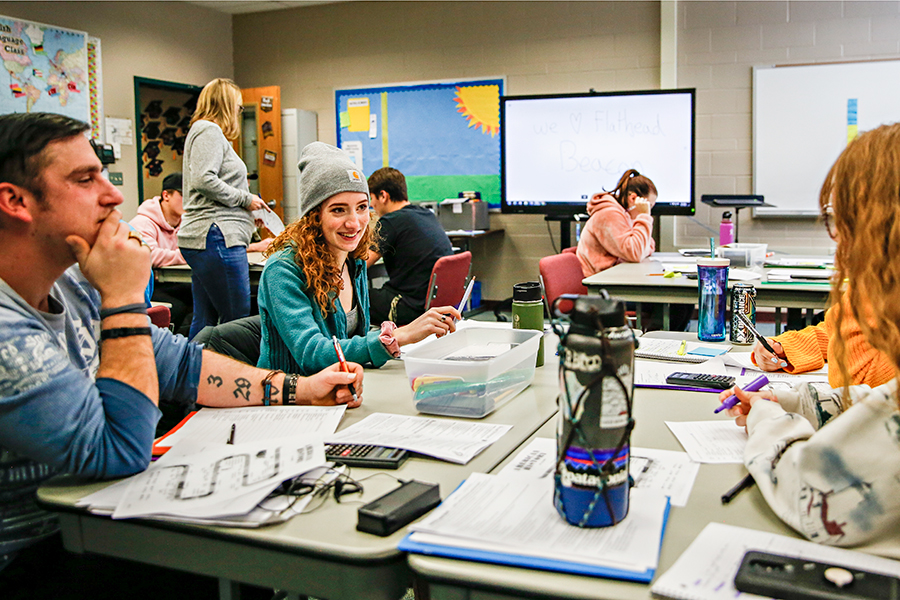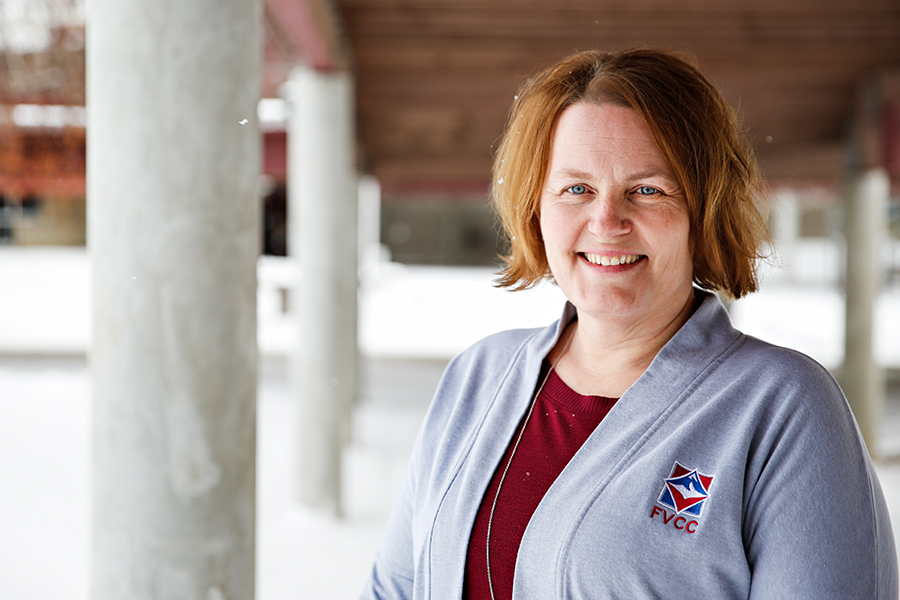Back to School: Teens and Adults Alike Seek High School Equivalency
Flathead Valley Community College’s HiSET preparation courses draw people from a wide variety of backgrounds
By Myers Reece
Ashley Woods dropped out of 10th grade after getting pregnant. She enrolled in adult-education classes but was overwhelmed by her duties as a new mother and teenage distractions. She moved from Florida to Kalispell 14 years ago and carved out a career in the restaurant industry, including 10 years working in various positions at Applebee’s in Evergreen, although earning a high school diploma loomed in the back of her mind.
Two decades later, when her oldest son turned 21, Woods decided it was time. She looked into courses at Flathead Valley Community College that help students prepare for the High School Equivalency Test (HiSET), one of three high school equivalency exams in the U.S., along with TASC and GED. Woods enrolled in FVCC’s night HiSET classes, a student once again at 37 years old.
In December, Woods was one of the speakers at FVCC’s graduation ceremony for students who earned their HiSET credential. She was among the oldest graduates, but the pride filling the room transcended age and background.
“It was never anything that I felt like I needed to do to prove to anybody, just myself,” Woods said. “I realized at some point in my life that there are some things people can’t take away from you and education is one of those things. It was really nice to finally get it accomplished.”
The U.S. Census Bureau said in 2017 the percentage of people 25 and older who had completed high school — either with a diploma or equivalent credential — reached 90 percent nationwide, the highest mark in history. In 1940, as a stark contrast, more than half of the country’s over-25 adults hadn’t completed high school.
Today, far more than in the early 1900s, lacking a high school or equivalent diploma closes numerous employment opportunities, at times denying their possibility altogether or limiting the earnings ceiling. Woods says she was fortunate to have circumstances and colleagues that enabled her to find a niche in the restaurant industry, where she worked her way up the ranks to her current position as a purchaser for Advanced Restaurant Supply. But her experience bucks national statistics.
In 2017, the Census Bureau estimated that 26.4% of adults age 25 or older who hadn’t completed high school lived in poverty, with median annual earnings of $21,738, including only $16,431 for women. Flathead County’s 2017 statistics roughly mirror the national figures, although women age 25 or older without a high school education were estimated to earn an even lower median annual wage of $14,826, compared to $26,781 for men, although there is a few thousand-dollar margin of error.
Andrea Aus, FVCC’s director of adult education, and Jacquie Wroble, the college’s adult education program coordinator and English as second langue instructor, say students in the HiSET preparation courses enroll for a variety of reasons, although career opportunities are often the underlying motivational factor, whether that’s by continuing on to college or furthering their standing in the workplace.
“It definitely opens up career opportunity, and sometimes that’s career advancement,” Aus said. “It’s the 17-year-old working in a coffee shop who now has a high school equivalency and can now be a manager. Or it’s the student working part-time and can now become full-time.”
“We’re getting more people who come in and tell us, ‘My employer is saying I have to have a high school diploma on record, even though I’ve been there a couple years, in order for me to keep my job,’” she added.

Aus also noted that two men currently enrolled are fathers of grade-school children who are hoping to improve skills to better assist their kids with schoolwork.
“What our instructors do in the classroom is more than just HiSET prep,” Wroble said. “It’s really preparation for college and career and life as well.”
The FVCC HiSET preparation courses run in six-week increments, with the most recent beginning Jan. 13, and focus on the five subjects included in the HiSET: reading, writing, math, science and social studies. Students must be 16 years or older and not attending high school, and are required to attend an orientation and complete a Test of Adult Basic Education (TABE). They spend 12 hours a week in class, plus numerous hours doing homework outside of the classroom.
Fourteen students are enrolled in the current course, a lower figure than usual. The college also provides HiSET preparation at its Libby campus and has HiSET tutors, who work on an as-needed basis, in Eureka and Thompson Falls.
“In Sanders County, the need is huge,” Aus said. “It’s a matter of getting people to come in and getting them to recognize it is a need.”
Another one of the speakers at the FVCC HiSET graduation in December was Anna McLean, an 18-year-old who home-schooled until she stopped in ninth grade when she was working two jobs at local food franchises.
“I was super overwhelmed trying to get school done, so I kind of gave up and didn’t think school was something that’s possible for me,” McLean said.
But McLean enrolled in the FVCC courses last year, realizing that her educational level precluded her from the jobs she wanted and the possibility of joining the Air Force. She also wanted to make her parents proud and set an example for her younger siblings. While the process was difficult, she said FVCC’s instructors encouraged her.
“If it wasn’t for them, I wouldn’t have my diploma,” she said. “They’ll do anything to help you through it — no matter what you’re going through — to make your goals possible.”
“I’m very excited,” she added. “Sometimes when I think back, I think, ‘Wow, I still can’t believe it,’ because it was something I thought I wouldn’t be able to do. It was a very big achievement for me.”